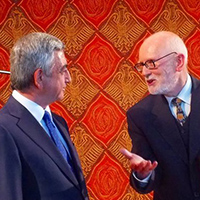 |
Eighty years ago, on 2 November in Siedliska, Andrzej Pisowicz was born – an outstanding Polish scholar of Armenian and Iranian Studies, member of the Council of the Research Centre for Armenian Culture. On this occasion, the employees and co-workers of the Centre would like to wish the Professor a happy birthday! Unfortunately, this important anniversary occurred during the pandemic and the planned celebration in honour of the Professor could not take place in the usual form. Nevertheless, we are with him in our thoughts, we thank him for his wonderful academic work and wise judgments about times, people and matters, we express our gratitude for so many years of work in such an important field for our team, and we ask for further kindness and cooperation. And we sing (in our thoughts) the traditional song in honour of the dignified jubilarian:
Plurimos annos, plurimos
Plurimos annos, plurimos
Annos, annos plurimos.
In recognition of his great contribution to learning about Armenian culture, we dedicate volume seven of the journal Lehahayer (2020) to him.
Professor Pisowicz is a graduate of oriental studies in Kraków. In addition to his education at the Jagiellonian University, he also studied Armenian philology from 1961 to 1963 in Yerevan, and then further expanded his knowledge at the École des langues orientales vivantes in Paris (for Western Armenian and Persian languages) and at the Institut Catholique de Paris (for Old Armenian language). After starting work at the Jagiellonian University, he held the posts of Head of the Department of Iranian Studies (1976-1994) and deputy director of the Institute of Oriental Philology (1989-1994). In 1994-1995 he worked as a counsellor at the Polish embassy in Tehran. He is a member of Collegium Invisibile, an academic association serving as a forum for the most promising Polish students, Polish doctoral students and their tutors.
His first academic work (1963) concerned the Armenian dialect of the village of Pharpi. He also devoted other books to the Armenian language: Le développement du consonantisme arménien (1976), Słownik pisarzy radzieckiej Armenii [Dictionary of Soviet Armenian Writers (1992)], Gramatyka ormiańska [Armenian Grammar]. Grabar – aszcharabar [Armenian Grammar. Classical Armenian-Lay Armenian] (2001), Mały słownik ormiańsko-polski, polsko-ormiański [Small Armenian-Polish, Polish-Armenian dictionary] (2006, together with Shushanik Sedojan and Norajr Ter-Grigorian). He wrote about Armenian culture in the broad sense of the word, not only about its language, but also about its literature, history, politics and diaspora, in many articles, notes, reviews, and translations. He described his life as a linguist and Armenologist in a book interview entitled Na końcu języka [At the tip of the tongue (2015)], with Kornelia Mazurczyk and Zbigniew Rokita.
Since 1980, he has been active in the Armenian Culture Interest Circle at the Kraków branch of the Polish Folk Association, and since 1990 in the Armenian Cultural Association. He edits Biuletyn Ormiańskiego Towarzystwa Kulturalnego [Bulletin of the Armenian Cultural Society], and runs courses in Classical and Contemporary Armenian, and in the Kucki dialect of the Polish Armenians. He is a consistent and tireless promoter of knowledge about Armenia and its culture in Poland. He has spoken publicly in defence of Armenian affairs, he has argued with pro-Turkish deniers of the Armenian genocide, and he has supported the Polish commemoration of the anniversary of this tragedy with his reputation and authority. He has striven to rectify the propaganda-driven falsification of Armenia’s history – both from the Azerbaijani side and from any other nationalists.
For us, Professor Andrzej Pisowicz is an authority in the fullest sense of the word. He built this authority not by holding offices and formal titles, but on the foundation of his research – in which he gave proof of his loyalty to scholarly principles – and his social commitment, always aimed at defending values. He gave testimony to this commitment in the Solidarity era, and he continues to give it to this day, taking the side of those defending Poland against total negation. By his attitude, he shows us that Polish patriotism can not only be beautifully combined with openness to the values of other cultures (we mentioned Armenian culture here, but the professor has also written about many other Oriental cultures, especially Persian and Caucasian ones), but that patriotism towards one’s homeland can even be an inspiration for such openness and a schooling in the understanding of other homelands.

